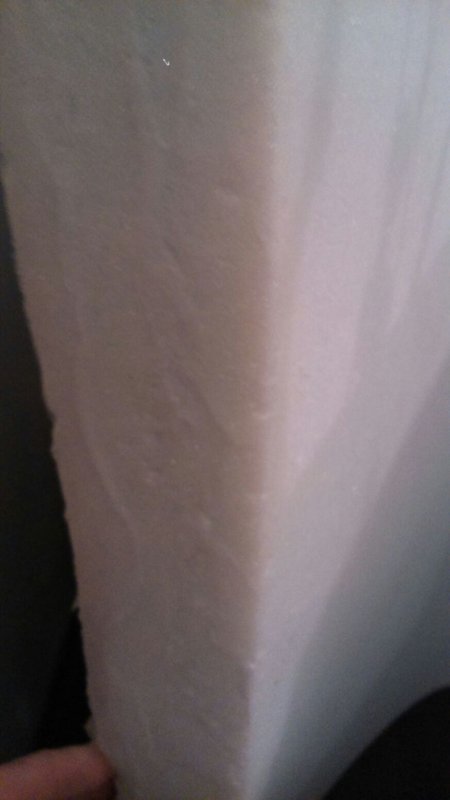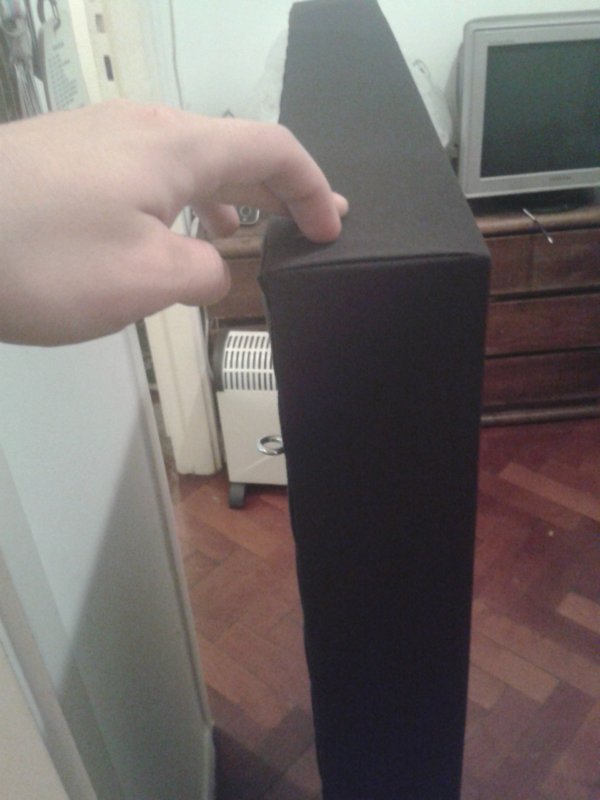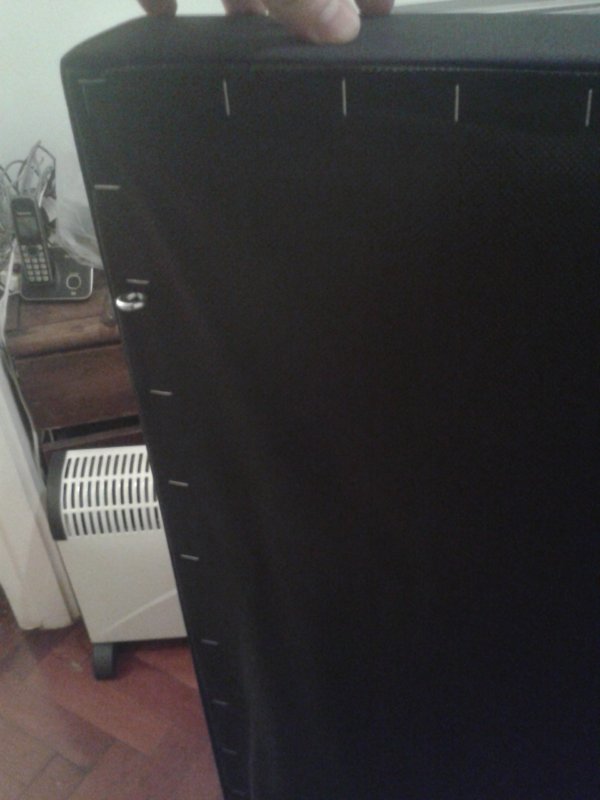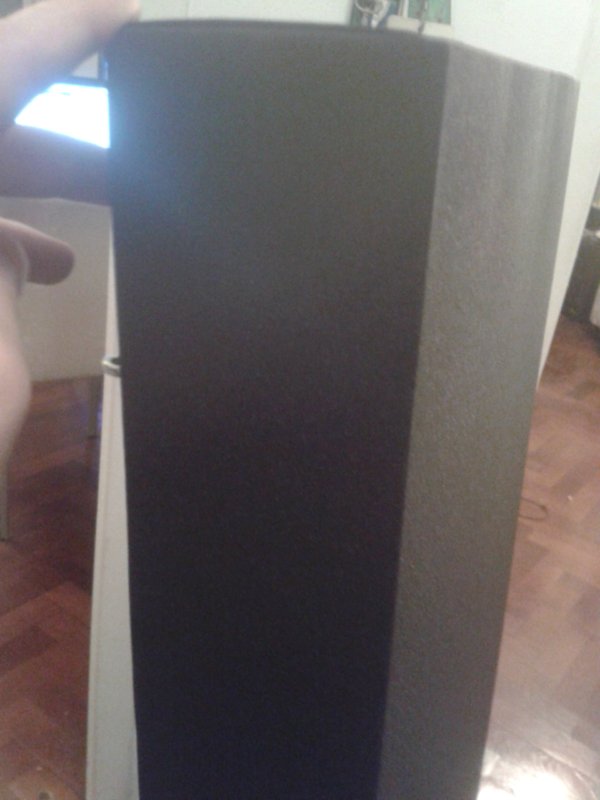Hi there,
Just bought brand new acoustic panels. These are 60cm x 120cm with rigid panel of polyurethane foam 40kg/m3 as the absorvent material. They are covered with good breathable fabric at both front and back sides. Images attached.
I put them on my bedroom studio and they absorb quite nicely for my needs which is electronic music. The problem is that after 10 or 15 min my nose and skin started to scratch, I'm also having breathing issues, my chest kind of hurts and started to have nausea and stomach irritation.
The whole reason why I bought these ones is because I wanted to avoid fiber glass and rockwool since I don't like the idea of sleeping with such material regardless how well covered it is.
Now I'm kind of confused and I don't know what the heck is going on. My understanding is that my house already has some sort of polyurethane, like in my cushion, bed, pillows, etc so it cannot be that. Or can it? Could it be the wood with what has been made? I read that some type of wood dust is also toxic depending the sensitivity of people.
Anyone has any experience or feedback? I hope I'm providing enough info if not kindly let me know. I could perhaps provide some additional pictures later.
Thanks in advance for all your help.





Comments
It would be more helpfull if you would tell what kind these are
It would be more helpfull if you would tell what kind these are and provide a link to where they can be viewed to get a better undrstanding of the data provided.
Hey Space! Thanks for jumping in. I just sent an email to the
Hey Space!
Thanks for jumping in.
I just sent an email to the guy who made the panels asking about the type of wood and specifications of the polyurethane material so hopefully I can provide more insight soon. I will also go to my doctor to check whether this could be a particular allergy I have.
Regards,
Uh...what i meant was provide the link HERE so we can look at th
Uh...what i meant was provide the link HERE so we can look at the product...but you do what ever best suits you :)
Anytime you do a DIY project, you should know what you are aller
Anytime you do a DIY project, you should know what you are allergic to first. So now you know. And you can contact an allergist. You might need epinephrine? This is not the first time things like this have happened. In fact one manufacturer of acoustic foam, some years ago, had to have a different formula that was more fireproof than their other prettier colored stuff. Which immediately tells you that the pretty looking stuff would give off noxious gases when burned. All the more fun.
Any kind of foam can be dangerous. They are made from industrial chemicals. What's there not to understand about that? It's not made from the same sponges you get from the sea. Though you might want to go that organic route? You're not allergic to shellfish are ya? You could make a nice diffuser out of shells. It's like you're not supposed to make your studio out of fireproof pressure treated wood. The chemicals will kill ya. So you don't die in a fire. But merely from asphyxiation.
This is why God created laughing gas.
Mx. Remy Ann David him
Space, post: 418393, member: 32398 wrote: Uh...what i meant was
Yes! I would love to do that but he doesn't have a websites he just provides his services through a similar eBay portal we have here.
RemyRAD, post: 418395, member: 26269 wrote: Anytime you do a DIY
Hi there,
I have actually never been allergic to anything. This would be the first time. I have an appointment with the allergist tomorrow so we will see what he says.
The issue is that I didn't do those panels myself, it was made by a guy here who already made hundreds of them. He is telling me that he is using all same materials and that no one had reported any issues.
After doing some research I think the problem here is that the polyurethane panel is off-gassing or liberating the fumes in the air of the chemicals that have been applied for retarding the fire and who knows for what else. Because of this I have put all panels outside so they "cure", hopefully that will get rid of the problems and the smells and health issues will go away.
Thank you,
I still say... I want that web address. Do not protect people th
I still say... I want that web address. Do not protect people that are not willing to protect you.
Just a thought - what glue did you use to stick them (if you use
Just a thought - what glue did you use to stick them (if you used adhesives)? Very often the adhesive contains rather nasty chemicals that can cause these symptoms, and usually it wears off after a short while. I can't say I've heard anyone with an allergy to the tiles themselves, and it's classed as an irritant only, isn't it? If you have wrapped them, then it's pretty well sealed.
Many of the adhesives, by comparison are pretty nasty things, certainly while the cure - they catch fire, they irritate, emit dangerous fumes and play havoc with asthma.
[In no way meant to be medical advice] [="http://www.pfa.org/fa
[In no way meant to be medical advice]
[="http://www.pfa.org/faq.html"]VOC and offgass info[/]="http://www.pfa.org/…"]VOC and offgass info[/] on foam from The Polyurethane Foam Association
[[url=http://="http://www.epa.gov/…"]EPA on formaldehyde[/]="http://www.epa.gov/…"]EPA on formaldehyde[/]
Formaldehyde being just one of a cocktail of possible gases from foam that could affect your health. If the panels have been treated with a flame retardant chemical, you add even more.
You didn't indicate what part of the world you are from, or where the foam panels were manufactured. Some countries have absolutely no regulations, and no qualms about producing things that produce toxins / irritants, as long as there is money to be made.
You may have been better off with the fiberglass: [[url=http://[/URL]="http://recording.or…"]Exposing the Myths of Fiberglass[/]="http://recording.or…"]Exposing the Myths of Fiberglass[/]
...and formaldehyde is nothing to toy with. After Hurricane Katr
...and formaldehyde is nothing to toy with. After Hurricane Katrina here in the South, thousands of temporary housing trailers were brought in by FEMA. And each and every one had a paneling inside that off-gased formaldehyde gases. Needless to say...these thousands of potential shelters for thousands of homeless families were USELESS but not until after hundreds of people including children got ill from the gas.( http://en.wikipedia.org/wiki/FEMA_trailer#Health_problems )
Where does Roxul sit in this risk factor? Any? I'm not talking
Where does Roxul sit in this risk factor? Any?
I'm not talking about damaged (soaked, damp) I'm referring to unaffected batts used in bass traps (wrapped in fabric).
Back in the early 1970s, studios were designed to be dead dead d
Back in the early 1970s, studios were designed to be dead dead dead and dead sounding. Since we didn't have anybody making any kind of foam thingies for studio applications, pink fiberglass was all over the studio. George Massenburg's studio was the most hideous of the offenders I ever saw or experienced. It's like I couldn't take a full breath of air in his studio since the entire place was bright pink with completely exposed Owens Corning Fiberglas. And while my time at FLITE THREE Recordings Inc., the pink fiberglass was behind burlap. Which was aesthetically a little more appealing and slightly less harmful. Since the Fiberglas didn't out gas anything. And if I get lung cancer? I won't be surprised. I know I've inhaled a lot of glass particles throughout my over 40 years in the business.
Everything in life has its risks. One must weigh those risks against your expected outcomes. Not knowing what you might be allergic to, can be deadly to you. And even if you are not allergic to something? The fumes alone may damage your health?
So the question here is, how important are acoustics for pop music recordings? The answer? None really. This comes from my personal experience spanning more than 40 years. Acoustics are important when dealing with fine arts recordings and not pop recordings.
When people complain about their home acoustics preventing them from obtaining a professional recording? It's really not due to the acoustics. It's not understanding what or how to do it correctly. You would learn this if you specialized in live on location recordings for albums, radio and television broadcasts. Where you don't get the choice of what the acoustics might be? They could be great? They could be god-awful. It doesn't matter. You still have to deliver a hit sound. And if you can't learn how to do that within a year or two? Maybe you might want to think about becoming a brain surgeon instead? Where you could maybe practice on somebody like Rick Perry or Bob McDonald? They would never know the difference if you screwed up. Since they obviously really don't have much of a brain to begin with. So you can afford to screw up on those guys instead of your recordings. They would never know the difference. So there is a place to start.
If you don't like the smell? Try some Poopourri. They have great advertisements and it works! It's for real. It's for your bathroom toilet. Where most of your recordings will go anyhow until you learn how to make good recordings under compromised acoustic conditions.
So throw out the foam or use some other kind of birth control.
Mx. Remy Ann David
imo/ pink isn't that much of a hazard. if you cover it with Gull
imo/ pink isn't that much of a hazard. if you cover it with Gulliford or burlap (hemp) fabric it's perfectly fine.
the best thing is either stryrofoam roof insulation panels .... or the best 702 / 704 etc ... again cover in Gulliford fabric.
Stryofoam has only the ability to reflect it has no absorbing ch
Stryofoam has only the ability to reflect it has no absorbing characteristics.
None...zero...nada.
Couple that with a metal veneer as in a roofing panel and it is all reflection and zero absorption.
there was a machine shop next to my studio in an industrial busi
there was a machine shop next to my studio in an industrial business park in CA. we lined the wall between us with blue styrofoam panels a roofer friend gave me for free and much to my surprise the sound of the machines and grinders / cnc mills went away. so the blue stuff does work to insulate for noise. i agree it did nothing to absorb but as you say, as a reflector it worked great!
at least you were smiling when you said that :)
at least you were smiling when you said that :)
DonnyThompson, post: 418506, member: 46114 wrote: Where does Rox
There is mostly no risk factor to a persons health. The biggest issue is airborne particles and respiratory concerns. This in and of itself is not a health concern saving that some are more prone to air borne particles than others. So that is why you want to cover any fibrous product up with cloth, to encapsulate the fiber. But you must always consider the ability of a product to catch fire so a fire resistant type of cloth has to be taken into consideration.
In a commercial environment it is a give in, it will be flame retardant but in a residential area the owner may choose not to do so, which we would not recommend, but it has passed muster.
Thanks, Space.
Thanks, Space.